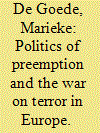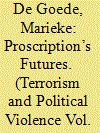| Srl | Item |
| 1 |
ID:
080894


|
|
|
|
|
| Publication |
2008.
|
| Summary/Abstract |
In the midst of the war on terror and unilateral US security politics, many observers look to Europe for alternatives. It is argued that Europe is particularly opposed to preemptive security practice, and prefers instead to rely on the rule of law. This article examines the meaning of preemption in the war on terror, and analyses three aspects of European counter-terror policy. It becomes clear that, with respect to a number of policies that play a key role in preemptive security practice, including criminalizing terrorist support, data retention, and asset freezing, the European Union is world leader rather than reluctant follower. Instead of relying on images that position Europe as inherently critical of preemptive security, debate concerning the legitimacy and desirability of such practices must be actively fostered within European public space
|
|
|
|
|
|
|
|
|
|
|
|
|
|
|
|
| 2 |
ID:
159896


|
|
|
|
|
| Summary/Abstract |
Proscription of individuals and groups potentially linked to terrorism in the form of targeted sanctions have become increasingly controversial in recent years, especially in Europe. Initially considered the less violent alternative when countering terrorism, individual proscriptions have become contested for their impact on due process rights and democratic space. This paper focuses on a key aspect of proscription measures that goes relatively unnoticed: its discourses and practices of time and temporality. It analyses in some depth the rationalities of time evoked, debated, accepted, and rejected in two court cases on individual sanctions. It focuses on two elements at work in these cases: first, the relation between the precautionary and the punitive; second, the politics of establishing and examining terrorist intention. In this manner, it contributes to broader literatures on proscription in two ways. First, it advances the debate on security temporalities in general and the discussion of future-oriented sanctions in particular, by focusing on recent cases and case-law. Second, the paper brings a focus on legal practice to proscription debates. The paper concludes that the juridical repertoire of establishing and assessing intentions is not just broadened but fundamentally altered in the current proscription regime.
|
|
|
|
|
|
|
|
|
|
|
|
|
|
|
|